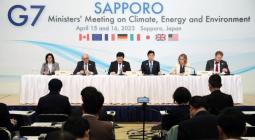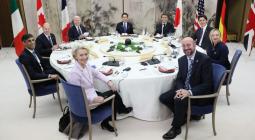Faith groups to G7 leaders: Peace requires a fossil fuel treaty

The city of Hiroshima has played an important role in almost every aspect of the global movement to stop the spread of nuclear weapons and to proscribe their use. But as the recent G7 meeting of leading industrial nations in Hiroshima has come to an end, some of the world's most powerful leaders have let two opportunities to further the cause of peace slip through their grasp. Their first missed opportunity is in failing to take substantive steps to accelerate momentum for a treaty on the prohibition of nuclear weapons. The second, equally important for the sake of peace, is in the area of climate change.
Military leaders, for over a decade, have recognized that climate change threatens stability and increases violent conflict. A parade of generals, admirals, secretaries of defense and national security advisers have repeatedly marched out language describing climate change as a "threat multiplier" causing conflict due to large-scale migration, food security, fights over water and other resources, and the resulting geopolitical instability.
In addition, studies have demonstrated the link between rising temperatures, climate impacts and the likelihood of outbreaks of violence on an interpersonal and group or national level. In other words, hotter temperatures don't only make individuals more irritable and argument-prone. The higher the temperature, the more likely domestic violence (up 60% in a 2021 study of one region suffering from a climate-driven heatwave), conflict between neighboring groups in resource-scarce areas, and cross-border wars actually become.
Fossil fuel use today is causing oceans to warm at the same rate as if five Hiroshima bombs were detonated underwater every second for a year. For religious leaders, recognizing the link between climate change and violence is more relevant than ever.
The 49th G7 summit May 19-21 touched on issues of violence and peace, but limited its discussions on the topic to the deplorable Russian invasion of Ukraine, and their unity in supporting the Ukrainian cause. They did focus on climate change, with their actions following the new political playbook of increasing support for renewable energy — which is good — while rationalizing their preposterous expansion of fossil fuels under the banner of "energy security."
"We stress the important role that increased deliveries of LNG [liquefied natural gas] can play, and acknowledge that investment in the sector can be appropriate in response to the current crisis," G7 leaders' communiqué read, despite the fact that the world is on track to produce more than 70% more fossil gas than is compatible with the 1.5°C goal enshrined in the Paris Agreement. In addition, the G7 statement included wording which not only avoided setting a 2030 phase-out date for coal-fired electricity plants — widely recognized as long-overdue — but even supported the expansion of coal plants in a manner particularly important to the Japanese government. Germany and Japan still get about 30% of their energy by burning coal, with the U.S. at about 20%. Coal is the dirtiest of all fossil fuels, and fossil fuels together are responsible for more than 75% of all greenhouse gas emissions.
To date, when faced with the choice of phasing out or expanding fossil fuel development, almost every government on the planet has chosen expansion
This brings us back to the tragic, infuriatingly familiar litany of climate impacts, which is where our religious and moral sensibilities quickly become engaged:
- Climate-induced droughts, floods and other extreme weather events damage crops, reduce the availability of water, and increase food insecurity and poverty.
- Climate change displaces people from their homes and forces them to migrate elsewhere in search of survivable living conditions. This leads to conflict over resources including land, water and food — especially if resources are already scarce.
- Women are particularly vulnerable to the violence unleashed by a hotter planet. United Nations Environment estimates that 80% of displaced people are women and girls, who face dramatically increased risks of sexual violence and exploitation as refugees.
- UNICEF reports that over 50 million children have been forced from their homes by climate-related events. These numbers will skyrocket in the coming years without an immediate response.
We don't need to remind faith communities that those who suffer the most from these life-endangering impacts are people and communities who, historically, have done nothing to create the crisis. If we were to design an example of injustice, it would be hard to do worse than the climate crisis.
There is simply no way to reconcile climate complacency with faith in Christ, who calls us to stand in solidarity with the marginalized and oppressed.
This is why, in the G7's immediate aftermath, GreenFaith and the Laudato Si' Movement renewed our call to governments for a Fossil Fuel Non-Proliferation Treaty. In the past year, countries including Vanuatu, Tuvalu, Fiji and Tonga became the first nation states to call for such a treaty. They joined 86 cities and subnational governments of the likes of London, Warsaw, Paris, Barcelona, Kolkata, Buenos Aires, and Sydney.
GreenFaith and the Laudato Si' Movement joined Green Anglicans, Islamic Relief Worldwide, Soka Gakkai International and the World Council of Churches in issuing an open letter calling for G7 governments to lead efforts for a Fossil Fuel Non-Proliferation Treaty with three interconnected and essential commitments, which together are the pillars of a sustainable future.
First, we called for an immediate end to new fossil fuel project development, which is the precondition for solving the climate crisis. This echoes the International Energy Agency's unequivocal 2021 statement that meeting the Paris Agreement's 1.5°C temperature rise limit required an immediate stop to new coal, oil and gas development.
In this sense, the recent Pope Francis' message for the 2023 World Day of Prayer for the Care of Creation (Sept. 1) claims that "according to the commitments undertaken in the Paris Agreement to restrain global warming, it is absurd to permit the continued exploration and expansion of fossil fuel infrastructures." Furthermore, "The world leaders who will gather for the COP28 summit in Dubai from 30 November to 12 December must listen to science and institute a rapid and equitable transition to end the era of fossil fuels," he stated. Such a treaty "holds great promise to complement and enhance the Paris Agreement," said Jesuit Cardinal Michael Czerny, prefect of the Vatican Dicastery for Promoting Integral Human Development.
Second, we called for a pathway for a fair phase-out of existing fossil energy production, allowing more vulnerable nations more time to make a just energy transition.
And third, we called for funding for climate-related loss and damage and for a just transition to enable impacted workers and communities to undertake the job training and community redevelopment that the just energy transition will require. Such investments would unlock a better future for billions of people. For example, an International Renewable Energy Agency study on development in Africa calculated that compared to the continent's current fossil-fuel heavy plans, "a path to 1.5C would deliver an additional 6.4% in GDP growth by 2050, 3.5% more jobs and a 25.4% higher welfare index."
None of these three conditions are easy. But it could not be more clear that they are the necessary, right steps to take. They represent the ethical foundations for a sustainable future. People of faith must advocate for them with passion and resolve. One way to lend support is to sign the Multi-Faith Letter for a Fossil Fuel Non-Proliferation Treaty.
As the G7 meeting ends and we approach the annual U.N. climate negotiations in the United Arab Emirates, whose president and agenda-setter is the CEO of the country's national oil company, people of different religions and goodwill around the world can speak out and work within their communities to support change. Governments will not act with adequate ambition until they know that large numbers of people understand what is at stake, care, and demand action. Failure to act will cause irreparable damage to the ecosystems on which human civilization depends, and to hundreds of millions of the world's most climate-vulnerable families. Principled, ambitious, rapid action can create a better future for all.
cover photo:G7 world leaders attend a working session on the final day of the G7 Summit, May 21 in Hiroshima, Japan. From left: Japan's Prime Minister Fumio Kishida, U.S. President Joe Biden, German Chancellor Olaf Scholz, Britain's Prime Minister Rishi Sunak, European Commission President Ursula von der Leyen, Ukrainian President Volodymyr Zelenskyy, European Council President Charles Michel, Gianluigi Benedetti, Italian ambassador to Japan, Canada's Prime Minister Justin Trudeau, and France's President Emmanuel Macron. (Stefan Rousseau/Pool via AP)



